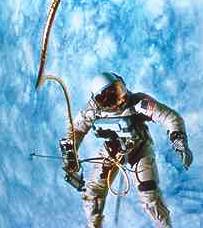
The suppression of the human immune system in space was first observed forty years ago during the Apollo missions when more than half the astronauts reported a bacterial or viral infection either during or shortly after their mission. To further study the effects of micro-gravity on the immune system, a shuttle flight in 1991 carried out experiments that identified T-cells as the components of the immune system that were compromised. That experiment was carried out by San Francisco VA Medical Center researcher Millie Hughes-Fulford, who has now built on that knowledge by identifying the specific mechanism behind the compromised T-cells. Her new research is published in the journal FJ Express.
“This is a specific signal pathway that is not working in the absence of gravity,” said Hughes-Fulford. “You’re short-circuiting a whole lot of the immune response – namely, the ability to proliferate T-cells – which shouldn’t be a surprise, because life evolved in Earth’s gravity field.”
Hughes-Fulford speculates that cell structure may trigger the effect. “Why do some pathways work and some not? Perhaps it’s differences in the cytoskeleton – the interior architecture of the cell. It’s the infrastructure of the cell, a membrane made of lipid, and maybe without gravity it’s not as well-organized as it should be.”
The problem of immune function in space must be solved if human beings are ever to live in space for extended periods of time. Hughes-Fulford believes the new findings provide a potential key to developing treatments and she intends to further her studies when Russian cosmonauts carry a custom-designed container housing the same experiment aboard a Soyuz spacecraft. “We know how these genes behave in simulated microgravity,” she said. “The results from Soyuz should tell us what happens during spaceflight, in real microgravity.”










![Spiritale [Bonus] My Hero Academia Ochaco Uraraka Zero Gravity 1/7 Figure picture](/store/img/-GUAAOSwBKVmZ~TE/s-l225//Spiritale-Bonus-My-Hero-Academia-Ochaco-Uraraka-Ze.jpg)







Comments are closed.